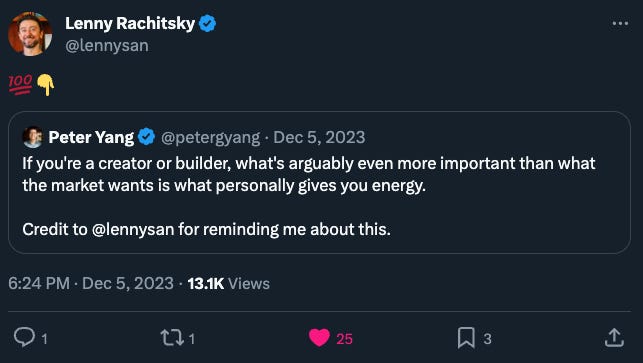How to Find Your Target Customer Niche in 5 Steps
Follow these 5 steps to define a niche for yourself - it'll make everything else easier
Dear subscribers,
Today, I want to share how you can find your target customer niche in 5 steps.
Finding a great niche for yourself makes everything else easier.
Looking for a job? A great niche can help you stand out as a candidate.
Selling a product? A great niche helps you find customers who are primed to buy.
So let’s cover 5 steps that you can take to find and validate your target niche.
Why niche down?
Here are two examples of why niching down matters:
a) Niche down to find a job
I started looking for a job over a year ago in a tough market. I targeted companies that:
Valued creators
Cared about building with the community
Had two-side marketplaces
I was able to land several offers in 2 months. When I interviewed outside my niche, it usually didn’t work out. If you’re looking for a job in today’s difficult market, it’s more important than ever to find a niche where you can stand out as the ideal candidate.
b) Niche down to boost sales

Imagine that you’re selling a course on time management:
A generic course can sell for $19 because it competes with free content.
A course for sales professionals can sell for $99 because it’s more targeted.
A course for outbound B2B power tools and gardening sales professionals can sell for $1,997 because it’s hyper-targeted to a specific niche.
Put yourself in the shoes of a B2B power tools professional. That $1,997 course will seem tailor-made for you. You’ll pay a premium because there’s nothing else like it.
The riches are in the niches, so let’s cover 5 steps to find a great niche for yourself.
1. Start with what you want
a) What gives you energy?
“The audience comes last. I’m not making it for them, I’m making it for me.
It turns out that when you make something truly for yourself, you’re also doing the best thing that you possibly can for the audience.” — Rick Rubin
This quote might sound crazy to product managers who are trained to solve other people’s problems, but I’ve found it to be true for my creator journey.
What’s more important than what the market wants is what you want. Everything becomes easier when you’re solving problems that you care about. So ask yourself:
What can I work on or talk about for years without getting bored?
For example, people are willing to pay alot for PM interview prep. But I can only talk about this topic for so long before it bores me out of my mind. In contrast, I can talk about crafting great products and creator businesses for years.
So understanding what you want is priority #1.
b) Where do you have credibility?
There are two ways to build credibility in a niche - as an actual expert and as a curious beginner. Let’s take the “AI productivity” niche as an example:
Actual experts have long track records. My friend Marily spent years getting an AI PhD before teaching a course on the topic.
Curious beginners share what they learn along the way. I don’t have an AI PhD, but I’ve learned enough to create a free AI course to help 1,000+ people level up.
The truth is:
People often learn best from those just two years ahead of them.
So think back to two years ago. Since then:
What questions have you answered?
What outcomes have you achieved?
For example, two years ago I had no idea how to build an audience or a creator business online. Making progress on both has led to great opportunities and connections, so I want to share what I learned with readers like yourself.
So consider targeting people who share your goals but are two years behind. You already know exactly how to help them achieve the outcomes that they want.
2. Craft an ideal customer profile (ICP) hypothesis
Now that you know what gives you energy and where you have credibility, it’s time to craft your ideal customer profile (ICP) hypothesis.
a) Draft your ICP hypothesis
An ICP hypothesis is simply an educated guess of who your ideal target customer is. Taking the time to create this hypothesis will help you find real customers later.
Here’s an example of an ICP hypothesis for this newsletter:
Function: Mid-career PMs and tech professionals
Income: $250K+ a year
Geography: Tier 1 cities in the US and abroad
Age: 30s and 40s
Problem: Burned out by the grind - want to build products and creator businesses that they’re proud of and can own.
Outcome: Craft quality products and creator businesses and take back control of their career and their time.
#7 is the most important point. You want to make an educated guess on the specific outcome that your ICP wants to achieve. It can’t just be to “ learn about X,” it has to be an outcome that will improve their life in a meaningful way.
b) Sanity check your ICP against four criteria
To build a business off your ICP hypothesis, it needs to meet four criteria:




